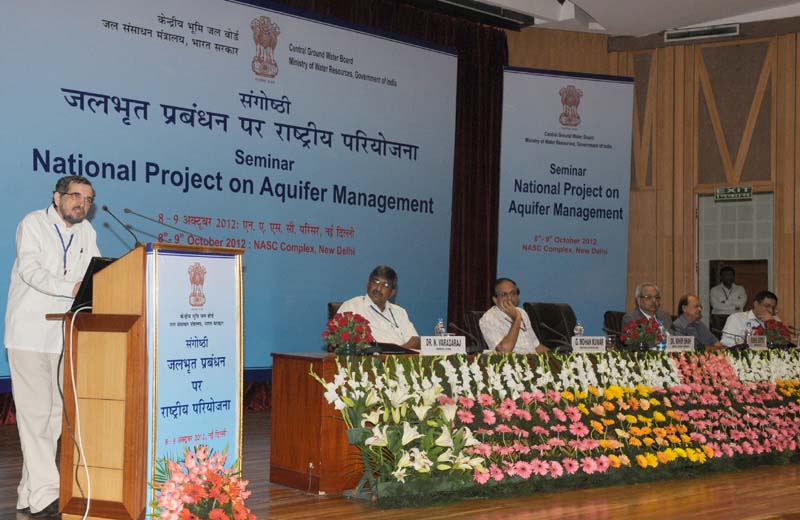Groundwater
Climate change adaptation in water management for food security - A consultation meeting by India Water Partnership
Posted on 19 Dec, 2012 09:20 AMThe meeting held on 22nd November, 2012 at the Institute for Human Development, New Delhi was followed by a discussion which included comments and suggestions of the experts and participants. The meeting was chaired by Prof. S R Hashim, President, India Water Partnership who was accompanied by Dr.
The APWELL Project: Andhra Pradesh's experience with participatory hydrological monitoring
Posted on 18 Dec, 2012 02:04 PMPreventing groundwater abuse depends on the users' knowledge of what constitutes this over-exploitation and abuse, and why it is undesirable. The success of APWELL, therefore, depends on participatory hydrological monitoring in which the users were trained in basic hydrology and charged with monitoring the hydrological balance of the watershed.
Ajit Pawar reinstated as Maharashtra deputy CM, despite being involved in a multi-crore irrigation scam - Roundup of the week's news (December 10 – 16, 2012)
Posted on 17 Dec, 2012 09:42 PMAjit Pawar reinstated as deputy CM of Maharashtra
Guidelines for groundwater abstraction- A document by Central Groundwater Authority, Ministry of Water Resources (2012)
Posted on 12 Dec, 2012 12:00 PMThis document by Central Groundwater Authority provides a set of guidelines to evaluate proposals/requests for the withdrawal of ground water. This is done with the following objectives:
Can storm water drains help in recharging groundwater? - The case of Chennai, Tamil Nadu
Posted on 10 Dec, 2012 06:08 PMOne of the most conspicuous activities in the preparation for the monsoons in several cities today is dug up roads ! Crores and crores are spent on the construction of storm water drains alongside roads in cities and towns to prevent flooding during the rains.
Seminar by CGWB on National Project on Aquifer Management stresses the need for a paradigm shift in groundwater sector from development to management
Posted on 10 Dec, 2012 05:39 PM
Inaugural session chaired by Dr. Mihir Shah
Image courtesy: www.readandknow.org
Highlights from the 10-year water policy research programme of the International Water Management Institute and the Sir Ratan Tata Trust discussed at the IWMI - TATA Annual Partners' Meet at Anand, between 28-30 November, 2012
Posted on 05 Dec, 2012 02:06 PMIWMI-Tata water policy research programme is a collaborative initiative between the International Water Management Institute (IWMI) and the Sir Ratan Tata Trust (SRTT).
Living rivers, dying rivers: Stuffed rivers of Vrishabhavathi-Arkavathi from the Cauvery system
Posted on 02 Dec, 2012 08:16 PMIntroduction

From ripple to a tide – A film by SDTT on its work with local NGOs and communities on diversion-based irrigation
Posted on 01 Dec, 2012 10:52 AMPart I: From ripple to a tide, a film by SDTT
Water for cities - Responding to the urban challenge – Technical papers from the Third National Groundwater Congress by CGWB
Posted on 01 Dec, 2012 08:59 AMDeliberations in the Congress organized by the Central Ground Water Board (CGWB) at New Delhi on March 22-23, 2011 focused on various issues viz., Integrated Water Resource Management, Artificial Recharge to Groundwater, Water Use




